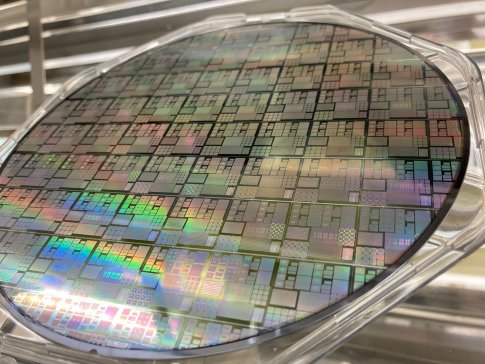ITRI and TSMC Collaborate on Advancing High-Speed Computing with SOT-MRAM
January 18,2024 -- ITRI has joined forces with Taiwan Semiconductor Manufacturing Company (TSMC) for pioneering research into the development of a spin-orbit-torque magnetic random-access memory (SOT-MRAM) array chip. This SOT-MRAM array chip showcases an innovative computing in memory architecture and boasts a power consumption of merely one percent of a spin-transfer torque magnetic random-access memory (STT-MRAM) product.
Their collaborative efforts have resulted in a research paper on this microelectronic component, which was jointly presented at the 2023 IEEE International Electron Devices Meeting (IEDM 2023), underscoring the cutting-edge nature of their findings and their pivotal role in advancing next-generation memory technologies.
Dr. Shih-Chieh Chang, General Director of Electronic and Optoelectronic System Research Laboratories at ITRI, highlighted the collaborative achievements of both organizations. “Following the co-authored papers presented at the Symposium on VLSI Technology and Circuits last year, we have further co-developed a SOT-MRAM unit cell,” said Chang. “This unit cell achieves simultaneous low power consumption and high-speed operation, reaching speeds as rapid as 10 nanoseconds. And its overall computing performance can be further enhanced when integrated with computing in memory circuit design. Looking ahead, this technology holds the potential for applications in high-performance computing (HPC), artificial intelligence (AI), automotive chips, and more.”

The SOT-MRAM array chip showcases innovative computing in memory architecture and boasts a power consumption of merely one percent of an STT-MRAM product.
The advent of AI, 5G, and AIoT has created a significant demand for rapid processing, necessitating new memory solutions characterized by enhanced speed, stability, and energy efficiency. The successful collaboration between ITRI and TSMC not only shines a light on the path toward next-generation memory technology but also strengthens Taiwan's international competitive advantage in the semiconductor sector.
Related Semiconductor IP
- 5G-NTN Modem IP for Satellite User Terminals
- 14-bit 12.5MSPS SAR ADC - Tower 65nm
- 5G-Advanced Modem IP for Edge and IoT Applications
- TSN Ethernet Endpoint Controller 10Gbps
- 13ns High-Speed Comparator with no Hysteresis
Related News
- Taiwan's ITRI picks MIPS' RISC processor core for cable-modem designs
- Taiwan's ITRI Licenses Improv's Configurable DSP Technology To Develop Single-Chip VOIP and MPEG-4 Platforms
- Taiwan Industrial Technology Research Institute (ITRI) to Build Semiconductor IP Delivery and Design Management Systems using D&R's IP Manager Series(tm)
- ITRI Selects HelloSoft's Algorithm To Power Their Next Generation VoIP Solutions
Latest News
- TES offers new High-Speed Comparator IPs for X-FAB XT018 - 0.18µm BCD-on-SOI technology.
- QuickLogic Reports Fiscal Fourth Quarter and Full Year 2025 Financial Results
- MIPS, GlobalFoundries Bet on Physical AI
- IPrium releases LunaNet AFS LDPC Encoder and Decoder for Lunar Navigation Satellite Systems
- Quintauris Introduces Altair: The Unified RISC-V Profile for Embedded Systems